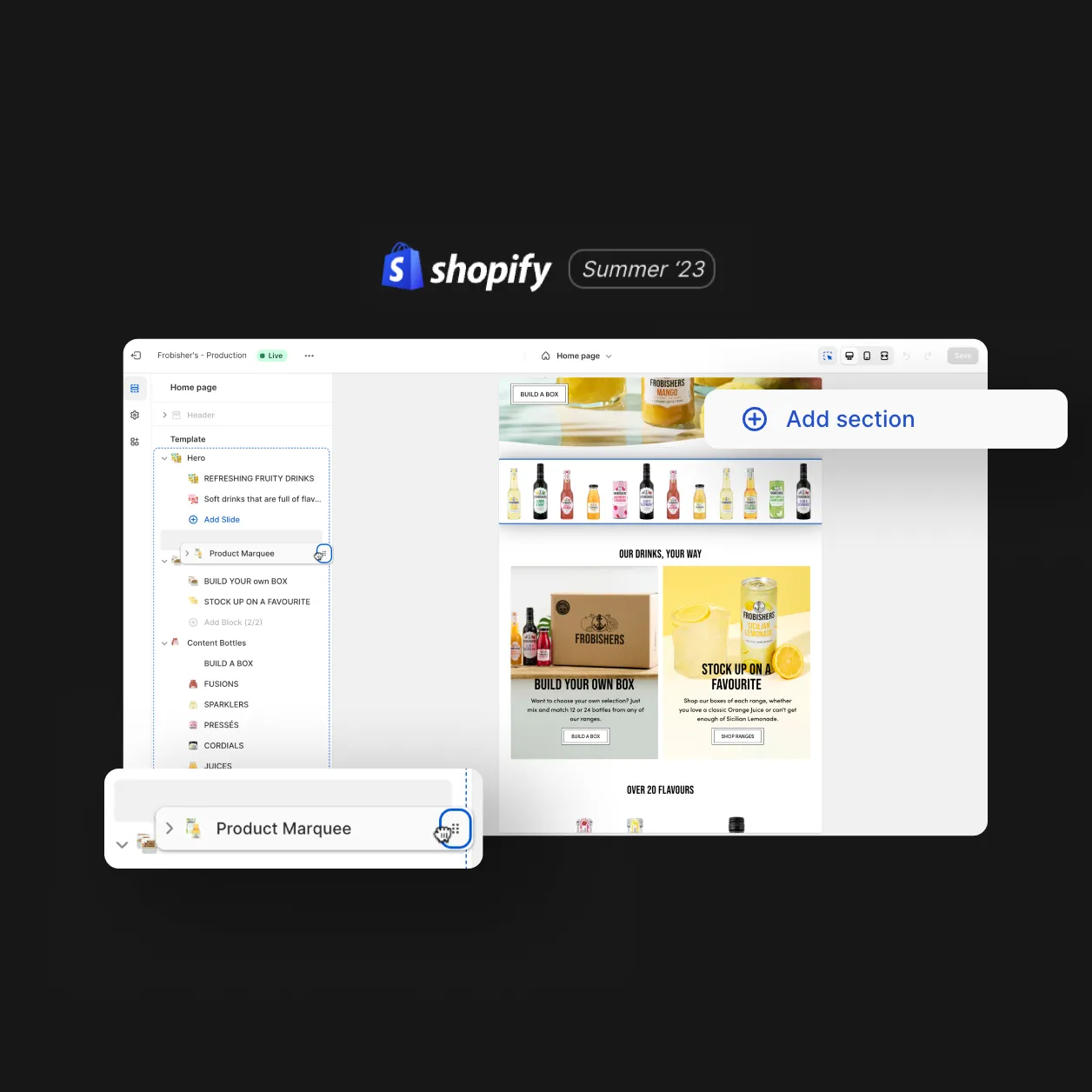
In the UK, e-commerce sales accounted for 27.5% of all retail sales in 2020 (source: Statista), with global e-commerce sales projected to reach $6.4 trillion by 2024.
Shopify Markets simplifies e-commerce for sellers by providing a centralized dashboard to manage currency, language, domains, duties, and inventory. It also offers automation and analytics. This article will explore each new feature in more detail.
Although Shopify has always allowed merchants to sell internationally using features such as shipping zones, multi-currency, and multi-language, Shopify Markets was specifically created to provide a seamless toolkit for merchants to sell across borders with ease and maximum visibility. In this article, we will delve into what Shopify Markets and Shopify Markets Pro are.
Use the links below to navigate to a specific section within the page:
An introduction to Shopify Markets
The Shopify platform has recently undergone a significant update called Shopify Markets. This update aims to simplify the process for e-commerce and Shopify merchants to sell their products to customers worldwide from a single store.
Shopify Markets: Currency control
Shopify Markets offers 136 different currency options for international customers to shop in their native currency, which can reduce cart abandonment rates by 33%. The platform provides a consistent multi-currency shopping experience from product pages to refunds, giving buyers confidence when purchasing from your store.
Multi-language translations
Shopify Markets enables merchants to translate their store for a global audience. Research suggests that customers prefer browsing in their native language, emphasizing the importance of proper translation for improved sales and shopping experience. Shopify Markets offers multiple language options through integrated translation apps, allowing merchants to cater to a global audience without creating separate stores for each region.
Localised domain name
Studies have shown that the domain extension used can impact a customer’s trust level. Shopify Markets provides localized domain names that are associated with specific countries and languages, offering an authentic experience for international customers. This can improve customer confidence in the local relevance of the website, increasing the likelihood of customers paying in their native currency as pricing and language settings are tailored to each targeted market.
When a user from Germany visits a website hosted in the UK through Shopify Markets, the website adjusts the language to German and displays prices in EUR. This customized experience increases the likelihood of the customer making a purchase. Shopify Markets also automatically sets SEO tags to improve website visibility for buyers. Additionally, the Geolocation app directs customers to the appropriate market based on their browsing location if they land on the wrong domain.
Taxes and duties collected with Shopify Markets
Selling internationally can lead to price fluctuations due to varying tax and duties rules. Shopify Markets addresses this by automatically calculating and collecting tax and duty fees during checkout, ensuring customers are aware of the total cost upfront and avoiding unexpected charges on delivery. This helps build customer confidence in the purchase and reduces cart abandonment. Although there is a 0.85% fee per order for duty and import taxes calculated with Shopify Payments, the benefits of increased international sales outweigh this small cost.
Pricing control and payments
Shopify Markets offers secure and direct payment options for international customers, allowing merchants to set specific prices for each market. Payment methods range from cards and bank transfers to third-party apps like Apple Pay and Paypal. Familiar payment methods can increase the likelihood of customers completing their purchase, and fees for using local payment methods are included in Shopify Payments international processing. Alternative payment provider fees are 1.5% per transaction with an additional 2% fee for currency conversion.
Inventory management
Shopify Markets allows merchants to serve products to customers in different markets by using inventory locations around the world. For example, if a merchant has warehouses in France and the US, buyers in Europe will only see inventory from the French warehouse, and buyers in North America will only see inventory from the US warehouse. This prevents overselling and ensures appropriate stock management.
Custom markets automation and analytics
With Shopify Markets, merchants can define market areas by creating a single country or grouping multiple countries together. Grouping regions can save time and improve efficiency for business strategies. Built-in analytics allow merchants to track performance across international markets, predict demand, set goals, and make informed decisions based on the data provided.
The different plans available
Shopify Markets offers different features based on the merchant’s plan, with additional features available on Advanced Shopify and Shopify Plus plans. All merchants can manage sales in multiple markets, with core features such as selling in 136 currencies and 20 languages, custom domains, and smart settings. Advanced plans offer custom pricing, customized catalogues, duty and import tax calculation, and fulfilment management. These features are ideal for large enterprises seeking to establish or maintain their international presence.
Shopify Markets Pro explained
Shopify Markets Pro is designed for merchants who want to sell in 150+ markets easily. Customers can shop in their own currency, and merchants can accept payments at assured exchange rates. Key features include fraud protection, compliance management, popular payment methods, simplified global operations, and reduced shipping labels. Shopify Markets Pro can be managed from a single dashboard and offers language choices and local currency pricing options to create a personalized experience for customers in each market.
The benefits of Shopify Markets
Shopify Markets enables merchants to expand their reach and tap into new markets, allowing them to sell to international customers in their native currency and language. This helps improve conversion rates and profitability. Additionally, Shopify Markets offers a wider range of local payment options, which can further improve conversions. Customised domains and localised content can also improve your store’s SEO ranking. Finally, Shopify Markets makes it easy to collect taxes and levies, which can help reduce cart abandonment rates and increase sales conversion.
The limitations of Shopify Markets
Shopify Markets has limitations worth noting. Additional features such as fraud prevention and prepaid shipping are only available through Shopify Markets Pro. Shopify Markets is also not yet fine-tuned to translate Shopify websites into certain dialects. Lastly, Shopify Markets can be expensive due to currency conversion and taxes and tariffs costs.
Summary
Shopify Markets is the go-to platform for global commerce. As businesses increasingly rely on international sales for growth, Shopify Markets simplifies the process with a comprehensive platform. Book a 30-minute consultation by clicking here to start to process of going international.
Design
Inspiring behaviour change through visual experiences. Our digital design services ensure instant clarity and visuals that cut-through in a cluttered market.




